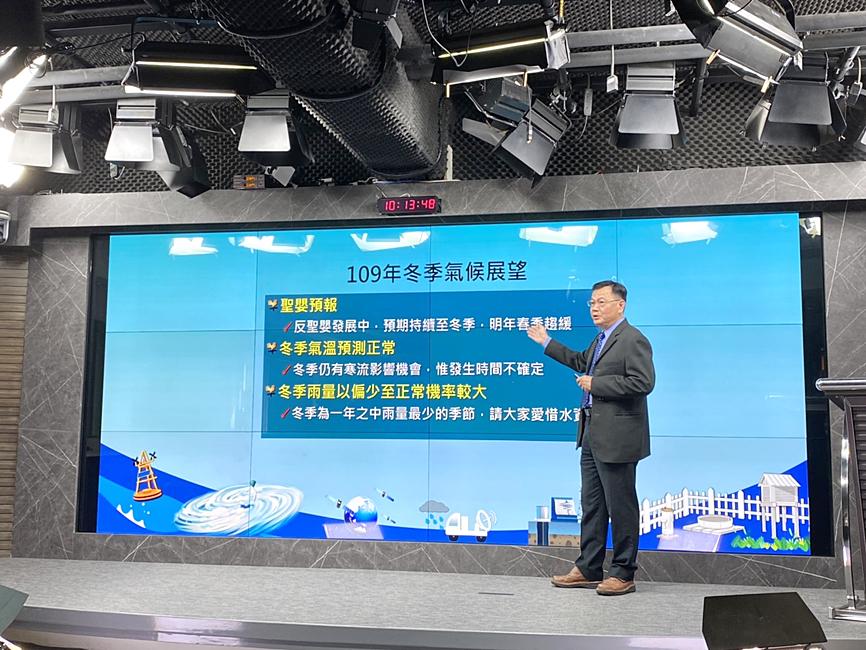The current water shortage is expected to worsen in the next few months, with the Central Weather Bureau (CWB) yesterday forecasting a colder, dryer winter than normal.
With winter starting next week, the bureau at a media briefing outlined the expected conditions through February and reviewed autumn’s significant weather events.
Weather Forecast Center director Lu Kuo-cheng (呂國臣) said that autumn this year had three major characteristics:

Photo: Hsiao Yu-hsin, Taipei Times
First, 13 tropical storms and typhoons formed from September to this month, up from 11 in the same period last year, Lu said.
Apart from Atsani, for which sea and land alerts were issued in Taiwan, the tropical storms and typhoons this autumn generally moved toward Japan or South Korea, or moved over the South China Sea, he said.
Second, as of Monday, the average temperature for autumn has been 25.9°C, 1.02°C higher than average, he said, adding that the figure would be the third-highest average for the whole season, behind 26.27°C in 2017 and 26.04°C in 2016.
Third, average rainfall was 354.8mm, 271.7mm less than average, Lu said.
Rainfall fell by more than 40 percent compared with autumn last year, he said.
Rain came from frontal systems, clouds in the circumfluence of typhoons or tropical storms, and the northeast monsoon, he said.
Most of the rain fell in Taiwan’s northeast, which had significantly more rainfall than the west coast, he said.
The bureau’s weather observation station near Sun Moon Lake (日月潭) in Nantou County recorded 86mm, the lowest rainfall reading since the station was established in 1941, Lu said.
The average in Chiayi County’s Alishan Township (阿里山) was the fifth-lowest since the station there was established, while stations in Taipei, New Taipei City’s Tamsui District (淡水), Hsinchu, Chiayi City, Taichung’s Wuci District (梧棲) and Taitung’s Chengkung Township (成功) are also reporting low autumn rainfall, which might make top 10 lists for dry years at each station, he said.
“The only months this year that had higher than average rainfall were May and August, while June, July and September had significantly less than average,” he said. “The average rainfall from June to this month was 902.5mm, or about 60 percent of the same period last year and the lowest since 1993.”
The rainy season in Taiwan ended earlier than usual this year, with no tropical storm or typhoons approaching the nation in July, Lu said.
Taiwan had similar conditions in 2014, when no tropical storm or typhoon made landfall in August.
Average rainfall from next month to February is expected to be from slightly below average to normal, he said.
Due to La Nina effect, the average temperature in the three months would be lower than normal, Lu said.
Next month, the average temperature would be warmer than usual, while January would be colder than normal, he said, adding that no forecast was available for February.
Cold waves are expected relatively frequently this winter, as La Nina tends to facilitate cold air from the north, Lu said.
Taiwan can expect about 6.6 days that are affected by cold waves this winter, he said.
La Nina is expected to gradually ease as spring arrives, he said.

A decision to describe a Chinese Ministry of Foreign Affairs statement on Singapore’s Taiwan policy as “erroneous” was made because the city-state has its own “one China policy” and has not followed Beijing’s “one China principle,” Deputy Minister of Foreign Affairs Tien Chung-kwang (田中光) said yesterday. It has been a longstanding practice for the People’s Republic of China (PRC) to speak on other countries’ behalf concerning Taiwan, Tien said. The latest example was a statement issued by the PRC after a meeting between Singaporean Prime Minister Lawrence Wong (黃循財) and Chinese President Xi Jinping (習近平) on the sidelines of the APEC summit

Taiwan’s passport ranked 34th in the world, with access to 141 visa-free destinations, according to the latest update to the Henley Passport Index released today. The index put together by Henley & Partners ranks 199 passports globally based on the number of destinations holders can access without a visa out of 227, and is updated monthly. The 141 visa-free destinations for Taiwanese passport holders are a slight decrease from last year, when holders had access to 145 destinations. Botswana and Columbia are among the countries that have recently ended visa-free status for Taiwanese after “bowing to pressure from the Chinese government,” the Ministry

HEALTHCARE: Following a 2022 Constitutional Court ruling, Taiwanese traveling overseas for six months would no longer be able to suspend their insurance Measures allowing people to suspend National Health Insurance (NHI) services if they plan to leave the country for six months would be abolished starting Dec. 23, NHIA Director-General Shih Chung-liang (石崇良) said yesterday. The decision followed the Constitutional Court’s ruling in 2022 that the regulation was unconstitutional and that it would invalidate the regulation automatically unless the NHIA amended it to conform with the Constitution. The agency would amend the regulations to remove the articles and sections that allow the suspension of NHI services, and also introduce provisional clauses for those who suspended their NHI services before Dec. 23, Shih said. According to

Minister of Labor Ho Pei-shan (何佩珊) yesterday apologized after the suicide of a civil servant earlier this month and announced that a supervisor accused of workplace bullying would be demoted. On Nov. 4, a 39-year-old information analyst at the Workforce Development Agency’s (WDA) northern branch, which covers greater Taipei and Keelung, as well as Yilan, Lienchiang and Kinmen counties, was found dead in their office. WDA northern branch director Hsieh Yi-jung (謝宜容), who has been accused of involvement in workplace bullying, would be demoted to a nonsupervisory position, Ho told a news conference in Taipei. WDA Director-General Tsai Meng-liang (蔡孟良) said he would